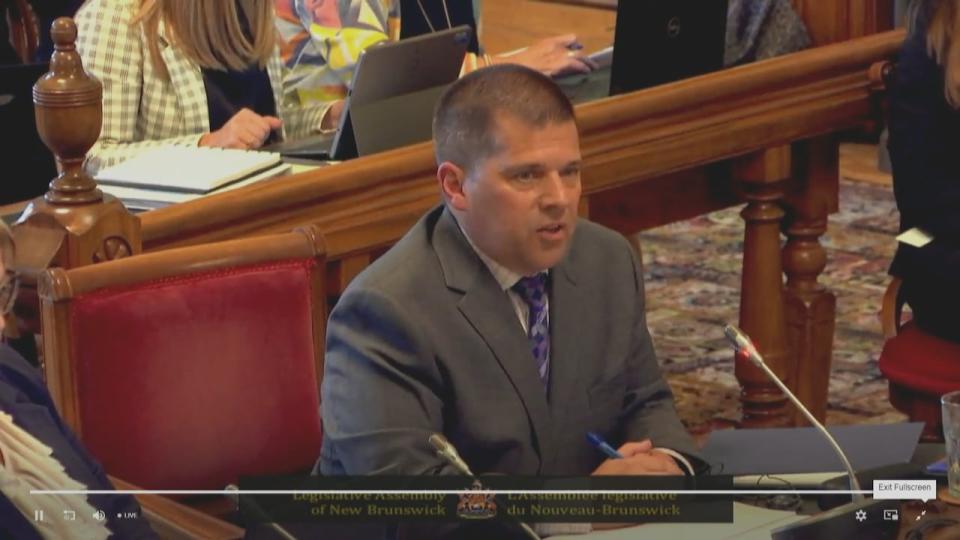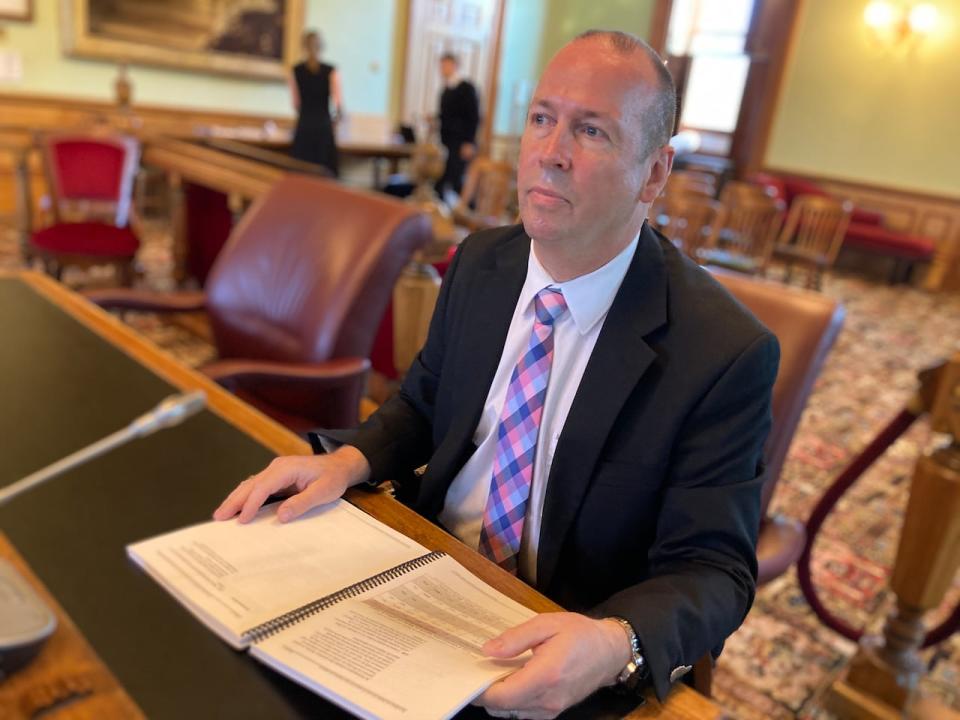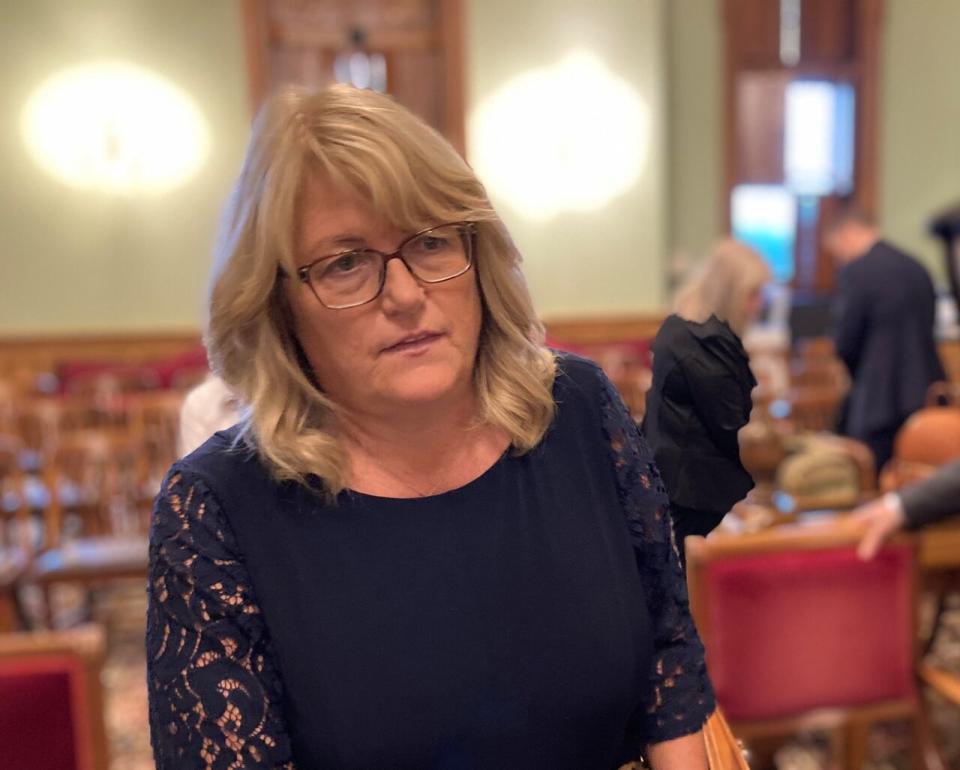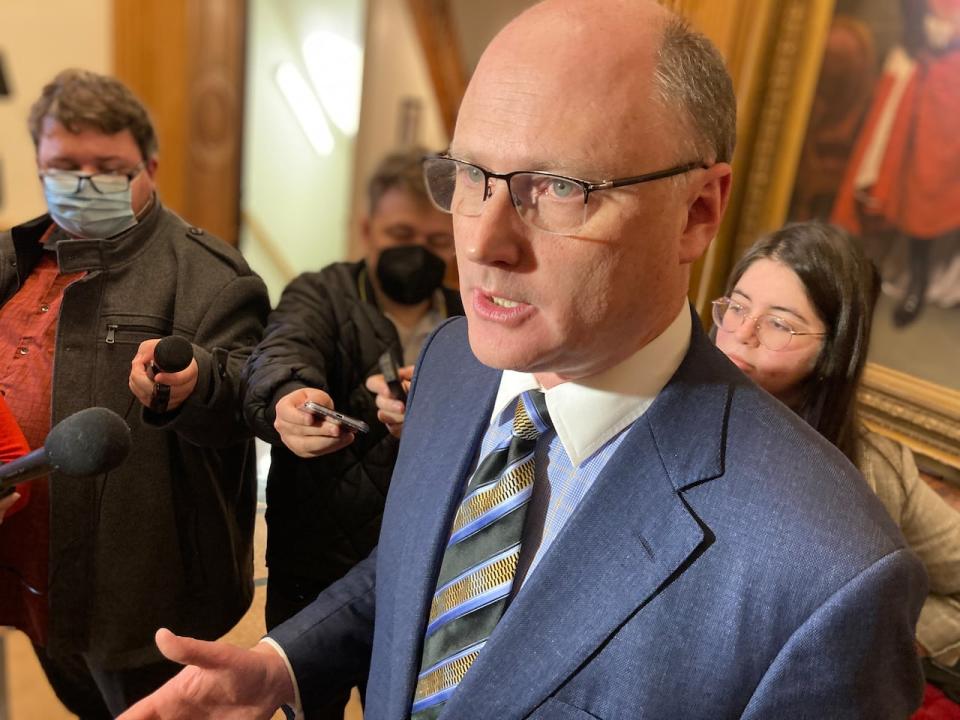'Confusion' delayed N.B.'s review of response to COVID in special care homes

New Brunswick's Department of Social Development is facing questions about whether it has made any improvements to its pandemic planning now as six nursing homes go through new COVID-19 outbreaks.
Departmental officials acknowledged to a committee of MLAs on Tuesday that there's been no internal review of how it handled the pandemic in special care homes because of what the deputy minister called "confusion."
Jim Mehan also said no protective measures are in place now because Public Health has not recommended any.
"What lessons have you learned? It doesn't seem like you've applied any right now," Green Leader David Coon told him during a meeting of the legislature's public accounts committee.

Mehan says no COVID-19 protective measures are in place now at special care homes because Public Health has not recommended any. (Legislative Assembly of New Brunswick)
"We don't want avoidable deaths occurring in our long-term-care sector, I'm sure you would agree. We don't want avoidable suffering from serious cases of COVID occurring if they can be avoided."
Long-term care homes were one of the province's most vulnerable sectors during the height of the pandemic, and Coon warned Tuesday that new variants of the virus could lead to spikes in cases again.
Mehan said six nursing homes and four special-care homes in the province now have outbreaks.
Responding to questions from Coon, the deputy minister said there are no masking or vaccination requirements for staff and no restrictions on them working in more than one facility, even if one has an outbreak.

Green Leader David Coon warns that new variants of the virus could lead to spikes in cases again. (Jacques Poitras/CBC)
The department was appearing at the committee to answer questions about a report by Auditor-General Paul Martin that concluded it didn't adequately prepare nursing homes for the pandemic.
That included a lack of personal protective equipment, or PPE, for staff to wear so they could avoid transmitting the virus.
Martin also found that recommendations from a review of the province's response to the H1N1 pandemic in 2009 were never adopted as part of a new pandemic plan.
Mehan told MLAs that one of those recommendations was for the department to keep an emergency stockpile of PPE and it did create one.
"Unfortunately the attention — making sure the stockpile was rotated and expired good were removed — did not happen, so when the pandemic happened, a lot of the PPE was expired," he said.
Martin's audit focused only on nursing homes, not other facilities such as special care homes.
Mehan said there's been no internal review of that sector either.
"Through confusion of my own and my peers, we were under the understanding that the AG's office was going to do that," he said.

Social development officials answered questions Tuesday about a report by Auditor-General Paul Martin that concluded the department didn’t adequately prepare nursing homes for the pandemic. (Jacques Poitras/CBC)
Once it became clear Martin was focusing only on nursing homes, the department decided that special care homes would be covered by a government-wide "after action review" that will soon get underway and be finished by next July.
MLAs also quizzed senior officials from the Executive Council Office, including the province's top civil servant, executive council clerk Cheryl Hansen, about Martin's report.
The audit identified a group of senior officials called "COVID Core" that several MLAs on the committee — including some former ministers who were in cabinet early in the pandemic — said they'd never heard of.
Martin faulted the government for keeping "no records" to support COVID Core meetings, such as minutes, agendas or discussion notes.
Hansen said COVID Core was an informal grouping of officials that "huddled" daily, sometimes several times a day, for a rapid check-in to coordinate the pandemic response across government departments.
"We suddenly had to learn how go quick, how to be fast, how to check with each other. And we needed a mechanism to do that, and that was the mechanism," she said.

Cheryl Hansen, clerk of the executive council, says COVID Core was an informal grouping of officials that 'huddled' daily, sometimes several times a day, for a rapid check-in to co-ordinate the pandemic response across government departments. (Jacques Poitras/CBC)
Hansen said she recognizes that the lack of records and minutes from the meeting is a valid concern.
"We recognized that and we feel we need to look at that."
She said she sometimes "scratched something down on a piece of paper" to keep track of what the group decided in a given meeting, but didn't say why those notes weren't given to the auditor-general.
Andrew Easton, the assistant deputy minister for security and emergencies, told the committee that the H1N1 recommendations were never implemented because of "a whole series of successive events" that kept the public safety department busy starting in 2010.
They included two major floods, post-tropical storm Arthur in 2014, an ice storm in 2017, cyber attacks and two fatal shootings of police officers in Moncton in 2014 and in Fredericton in 2018.
Progressive Conservative MLA Trevor Holder, who said earlier this month he was concerned about some of Martin's findings about the executive council office, said Tuesday he had received answers to many of his questions.

Progressive Conservative MLA Trevor Holder, who said earlier this month he was concerned about some of Martin’s findings about the Executive Council Office, said Tuesday he had received answers to many of his questions. (Jacques Poitras/CBC)
"I got a clear sense that the auditor-general's report is being taken seriously," he said, including Hansen's promise to have a more formal approach to a "COVID Core"-type body in the future.
"I feel satisfied that we're on the right path," he said.
His fellow PC MLA Andrea Anderson-Mason also said she believes the top officials "will do better next time" with documenting their decision-making, though she said she's still looking for answers on some other points.


